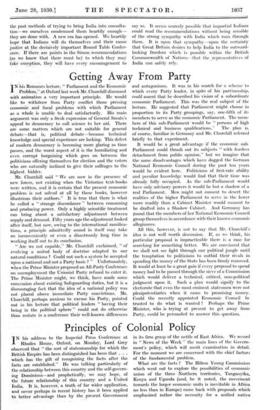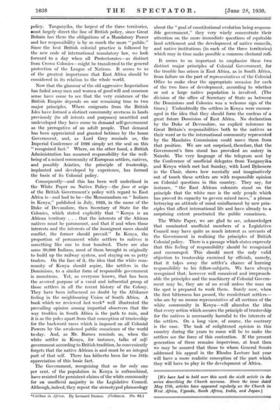Principles of Colonial Policy
IN his address to the Imperial Press Conference at Rhodes House, Oxford, on Monday, Lord Grey observed that " the -sort of statesmanship for which the British Empire has been distinguished has been that . . . which has the' gift of recognizing the facts after the facts are established." He was talking particularly of the relationship between this country and the self-govern- ing Dominions—and prophetically, we may hope, of the future relationship of this country and a United India. It is, however, a truth of far wider application, and never -perhaps in recent history has it been applied to better advantage than by the present Government in its firm grasp of the nettle of East Africa. We record in "News of the Week" the main lines of the Govern- ment's policy, which will merit examination in detail. For the moment we are concerned with the chief factors of the fundamental problem.
What are the facts ? The Hilton Young Commission which went out to explore the possibilities of economic union of the three Northern territories, Tanganyika, Kenya and Uganda (and, be it noted, the movement towards the larger economic units is inevitable in Afriea no less than in Europe) came back with proposals which emphasized rather the necessity for a unified native policy. Tanganyika, the largest of the three territories, must largely direct the line of British policy, since Great Britain has there the obligations of a Mandatory Power and her responsibility is by so much the more "public." Since the best British colonial practice is followed by the new code of international mandatory law, we look forward to a day when all Protectorates—as distinct from Crown Colonies—might be transferred to the general protection of the League of Nations. It seems to us of the greatest importance that East Africa should be considered in its relation to the whole world.
Now that the glamour of the old aggressive Imperialism has faded away men and women of good will and common sense have come to see that the very existence of the British Empire depends on our remaining true to two major principles. Where emigrants from the British Isles have formed a distinct community overseas in lands previously (to all intents and purposes) unsettled and undeveloped they have come to demand self-government as the prerogative of an adult people. That demand has been appreciated and granted betimes by the home Government, and, as Lord Grey reminds us, the Imperial Conference of 1926 simply set the seal on this "recognized fact." Where, on the other hand, a British Administration has assumed responsibility for the well- being of a mixed community of European settlers, natives, and possibly Asiatics, the principle of trusteeship, implanted and developed by experience, has formed the basis of its Colonial policy.
Consequently—and this has been well underlined in the White Paper on Native Policy—the fans et origo of the British Government's policy with regard to East Africa is—and had to be—the Memorandum on Indians in Kenya," published in July, 1923, in the name of the Duke of Devonshire-, then Secretary of State for the Colonies, which stated explicitly that "Kenya is an African territory . . . that the interests of the African natives must be paramount, and that if and when those interests and the interests of the immigrant races should conflict, the former should prevail." In Kenya, the proportion of permanent white settlers to natives is something like one to four hundred. There are also some 30,000 Indians, most of them brought in originally to build up the railway system, and staying on as petty traders. On the face of it, the idea that the white com- munity of Kenya should aspire, like settlers in the Dominions, to a similar form of responsible government is monstrous. Yet, as everyone knows, that has been the avowed purpose of a vocal and influential group of those settlers in all the recent history of the Colony. They have been influenced no doubt by the Afrikaner feeling in the neighbouring Union of South Africa. A book which we reviewed last week* well illustrated the prevailing opinion among impartial observers that the way trodden in South Africa is the path to ruin, and it is as the poles apart from that conception of trusteeship for the backward races which is imposed on all Colonial Powers by the awakened public conscience of the world to-day. And, as Mr. Barnes reminds us, when the white settler in Kenya, for instance, talks of self- government according to British tradition, he conveniently forgets that the native African is and must be an integral part of that self. There has hitherto been far too little appreciation of this basic fact.
The Government, recognizing that so far only one per cent, of the population in Kenya is enfranchised, have resisted the persistent claims of the white community for an unofficial majority in the Legislative Council. Although, indeed, they repeat the stereotyped phraseology *Caliban in Africa. By Leonard Barnes. (Gollancz. 10s. 6d.) about the "goal of constitutional evolution being respons- ible government," they very wisely concentrate their attention on the more immediate questions of equitable land settlement and the development of native councils, and native institutions (in each of the three territories) which may in time make possible a common electoral roll.
It seems to us important to emphasize these two distinct major principles of Colonial Government, for the trouble has arisen in East Africa, as in South Africa, from failure on the part of representatives of the Colonial Office to make clear the appropriate occasion for each Of the two lines of development, according to whether or not a large native population is involved. (The division of the office of Secretary of State as between the Dominions and Colonies was a welcome sign of the times.) Undoubtedly the settlers in Kenya were encour- aged in the idea that they should form the nucleus of a great future Dominion of East Africa. No declaration by the Duke of Devonshire, no explicit reference to Great Britain's responsibilities both to the natives as their ward or to the international community represented by the Mandates Commission could move them from that position. We are not surprised, therefore, that the Government's firm stand has provoked an outcry in Nairobi. The very language of the telegram sent by the Conference of unofficial delegates from Tanganyika and Kenya which met last Sunday, with Lord Delamere in the Chair, shows how mentally and imaginatively out of touch these settlers are with responsible opinion on Colonial questions in this country. They say, for instance, "the East African colonists stand on the principle that the white race is the only people which has proved its capacity to govern mixed races," a phrase betraying an attitude of mind uninfluenced by new prin- ciples that affect international life and have already to a surprising extent penetrated the public conscience.
The White Paper, we are glad to see, acknowledges that nominated unofficial members of a Legislative Council may have quite as much interest as servants of the Government in realizing the principles of British Colonial policy. There is a passage which states expressly that this feeling of responsibility should be recognized and encouraged. This should meet the only valid objection to trusteeship exercised by officials, namely, that it tat es away the settler's chance of learning responsibility to his fellow-subjects. We have always recognized that, however well conceived and irreproach- able the principles and the machinery of Colonial Govern- ment may be, they are of no avail unless the man on the spot is prepared to work them. Surely now, when the first bitterness has passed, the recalcitrant settlers— who are by no means representative of all sections of the white community in Kenya—will abandon the idea that every action which secures the principle of trusteeship for the natives is necessarily harmful to the interests of the settlers. On a long view, of course, the contrary is the case. The task of enlightened opinion in this country during the years to come will be to make the settlers see the force of this contention. If the present generation of them remains impervious, at least then we may be assured that those to whom General Smuts addressed his appeal in the Rhodes Lecture last year will have a more realistic conception of the part which they will have to play in the development of Africa.



















































 Previous page
Previous page